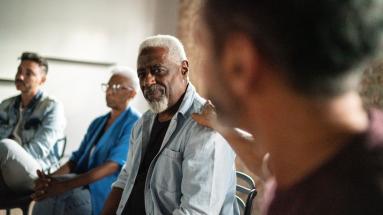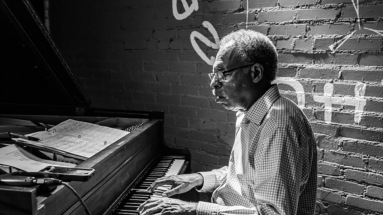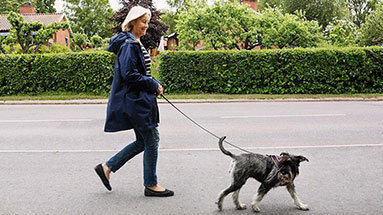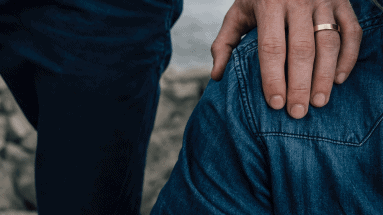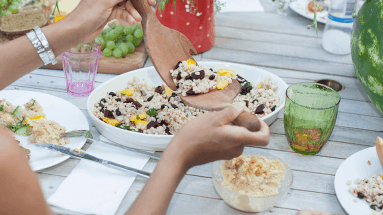Dating with cancer
Dating with cancer
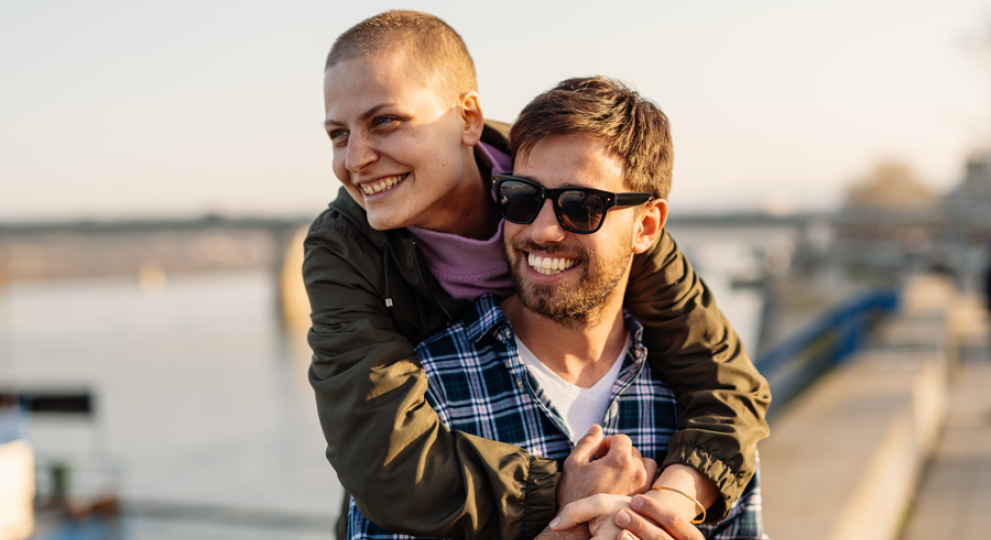
If you’re living with cancer and looking to meet a romantic partner, you might ask yourself questions like:
“Should I date?”
“Will anyone want to date me?”
“What should I tell a potential partner about my cancer – and when?”
If you’ve pondered these questions, you’re not alone. The fact is, cancer can change the experience of dating — from the moment you meet someone (whether in person or on an app) to the conversations you might have about the future. People living with cancer, at various stages in life, commonly come up against challenges like:
● Concerns about being close and intimate with someone
● Feeling unattractive or having low confidence due to body changes
● Fatigue, pain, or other challenges that make socializing difficult
● Fear of rejection
Still, dating with cancer is possible — and it may be a joyful and fulfilling experience. Dating can be a source of emotional support. In fact, there are many stories of people meeting their partners during their cancer journey — and in some cases meeting a special someone who’s also living with cancer.
"Dating, love, the excitement of a new relationship — happily, cancer doesn’t diminish any of this thrill," Dr. Karen Syrjala, co-director of the Fred Hutchinson Cancer Center’s survivorship program, told Fred Hutch News Service.
What’s important is approaching dating in a way that makes you comfortable. Because as with so many cancer-related questions, decisions around if, when, and how to date with cancer are deeply personal.
Deciding to date
If you’re living with cancer, the first big dating question may be, simply, whether or not you’re ready.
You may want to consider where you are on your cancer journey, how much energy you have to socialize, and how mentally prepared you feel to navigate conversations about your health.
You may find it helpful to reflect for a period of time before taking action. Ask yourself a few questions: Will you be able to be yourself? Are you experiencing side effects from treatment? What do you hope to gain from dating?
Only you can decide when you’re ready to date. Just remember that your health is the top priority and try not to pressure yourself into anything you’re not physically or emotionally ready for.
Navigating the dating scene
Even in the best of times, dating can be superficial — especially in the world of dating apps, where users make snap judgments based on appearances and first impressions. If you’re living with cancer, be prepared for responses and reactions that may be surprising or even hurtful.
Natalie, a young woman living with thyroid cancer, told the BBC in a story about dating after cancer that she was surprised by how many people commented on her appearance when she decided to try dating apps after her treatment ended. "It really threw me that the first thing people saw were the scars on my neck," she said. "It was frustrating that I joined as an empowering clean slate. I'm in a new place and nobody knows me as the cancer girl. And it was the first thing people saw."
One approach to consider is easing into dating — gradually putting yourself out there in lower-stakes social situations. Group events like classes or clubs may help you meet new people and build your self-esteem, without the risk of feeling judged or rejected.
Talking about cancer while dating
If your cancer isn’t part of the conversation between you and your partner from the start, you’ll need to decide when and how to tell them.
Some people prefer to be upfront — mentioning cancer in their dating app profile, for instance. Others would rather wait and talk to their partner about cancer face-to-face after they’ve had a chance to build a rapport.11 Like other decisions, it’s personal.
On a Memorial Sloan Kettering podcast, a person named Alex told the host, Dr. Diane Reidy-Lagunes, that some people living with cancer don’t have a choice. “If you have a very visible remnant of your treatment, sometimes that forces your hand,” he said. “If you don't have hair, if you have a cane or a limp or whatever. I had a part of my pelvis cut out and so I walk with a cane now, and so I ended up just mentioning cancer upfront right before I meet someone.”
Whatever you choose, it’s important that you share in a way that’s honest about your needs and feelings — just like in any relationship. Keep in mind that your partner may have questions. These might cover your health and history, and how cancer might affect your shared future. You may find it useful to prepare for this conversation and even write down in advance what you’d like to share.
Microsteps to consider when dating with cancer
Here are some Microsteps that can be taken to help you through different phases of dating when you’re living with cancer. As always, consult with your care team for the guidance and recommendations that are best for you.
Joining a group activity where you can meet new people in a relaxed setting.
If you’re new to dating with cancer, consider starting with a social activity that introduces you to new people in a fun, low-pressure setting. It might be a cooking or fitness class at your level, book club, volunteer activity, or something outdoorsy. This might not fit your definition of dating, but it can help you feel more comfortable socializing and putting yourself out there.
Exploring dating apps and communities for people living with cancer.
A growing number of dating apps, like CancerMatch, help people living with cancer connect with each other for companionship and romance. These communities may help you connect with others who have had a similar experience.
Reaching out to someone who’s farther along on their cancer journey to get their perspective.
Consider asking someone in your network about their experience dating with cancer. You can ask to chat on the phone or, if they're local, you could invite them to grab a coffee. They may be able to guide you toward more information, help you prepare for difficult conversations, and share their own experiences.
Practicing your “cancer talk” with a friend or loved one before speaking with your partner.
It’s normal to feel nervous before sharing intimate details about your health. Ask your friend to role play as your partner and respond in different ways to what you share. This exercise may help you feel more prepared for the real conversation.
Telling your partner your feelings around intimacy — in a non-intimate moment.
Cancer may affect your sex life in many ways, so try to bring this up with your partner in advance instead of waiting until you’re in the heat of the moment.15 This can help to set expectations and clear up assumptions. As Jillian Bissar, a social work counselor, told MD-Anderson Cancer Center for an article about dating with cancer, “Sex starts outside the bedroom.”
Setting aside time in a private, comfortable setting to talk about your physical and emotional boundaries around intimacy.
It's important to know and be able to share what you're comfortable with. Having the conversation in an environment you find relaxing can make it easier for both of you. Be open with your partner about what feels safe and enjoyable, as well as what doesn’t.
For more, check out this resource: Sexual health matters. Why is it so hard to talk about?
Developed with Thrive Global









